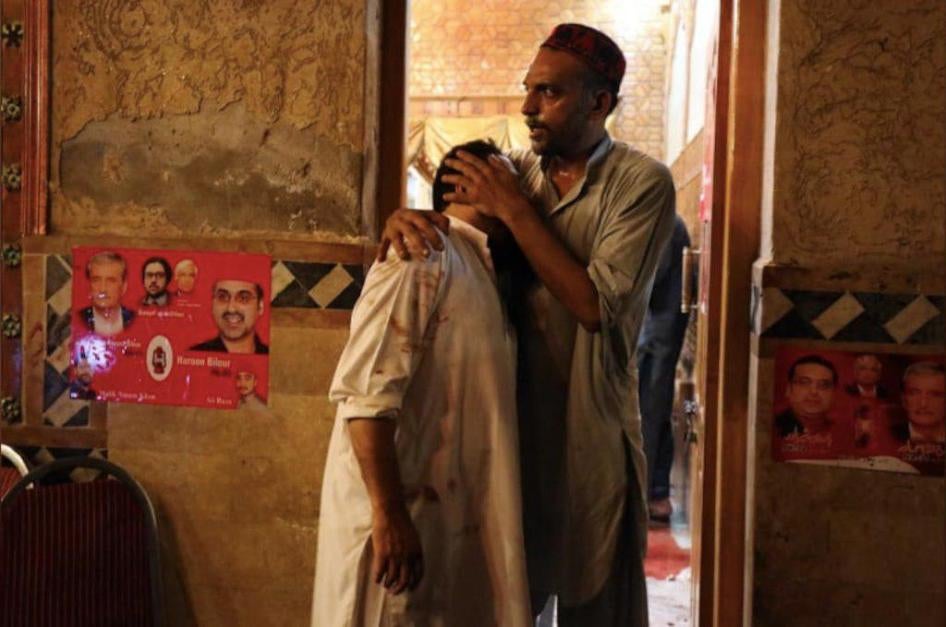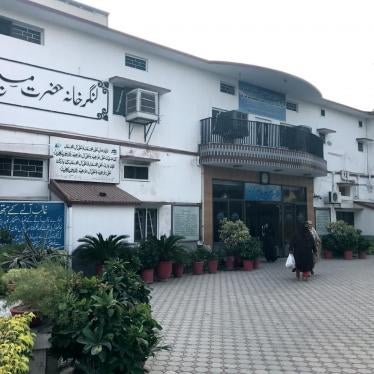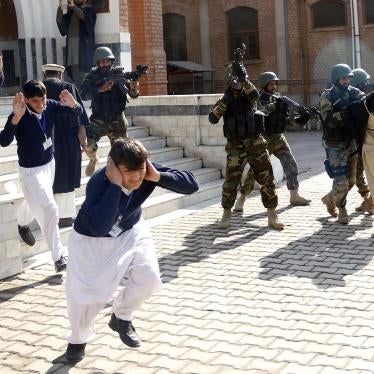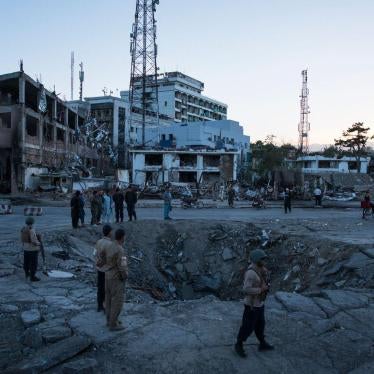(New York) – Pakistan’s interim government should take all necessary steps to ensure the safety of candidates and political party activists who are at risk of attack from the Taliban and other militant groups, Human Rights Watch said today. Nationwide parliamentary elections in Pakistan are scheduled for July 25, 2018.
Since July 10, attacks on political party candidates have killed more than 150 people and injured hundreds.
“The Taliban and other militants have killed and injured hundreds of people in their quest to disrupt Pakistan’s elections,” said Brad Adams, Asia director. “The upcoming elections could be severely compromised unless the government and security forces take immediate measures to ensure that all parties can campaign freely, without fear.”
The Taliban and other militant groups should cease attacks on people campaigning for office and their supporters. Pakistani authorities need to credibly investigate such attacks and appropriately bring those responsible to justice.
On July 13, in one of the most deadly suicide bombing attacks in Pakistan’s history, at least 128 people were killed during an election rally held by Nawabzada Siraj Raisani of the Balochistan Awami Party (BAP) in Mastung, Balochistan. Raisani was killed in the attack. A faction of the Taliban claimed responsibility, the media reported. In 2011, Raisani’s 16-year-old son was killed in a bomb attack targeting Raisani.
On July 10, Haroon Bilour, a senior leader of the Awami National Party (ANP), was killed along with at least 20 others in a suicide bombing targeting his election meeting in Peshawar, Khyber-Pakhtunkhwa (K-P). The militant group Tehrik-e-Taliban Pakistan (TTP) claimed responsibility for the attack. Bilour’s father, Bashir Bilour, also an ANP leader, was killed in a suicide bomb attack by the same group in 2012.
On July 13, four people were killed and at least 32 injured when the convoy of Akram Khan Durrani, a senior political leader of Muttahida Majlis-e-Amal (MMA), was targeted in a remote-controlled blast in Bannu, K-P. Durrani survived.
On July 10, Pakistan’s National Counter Terrorism Authority said that six political leaders and two political parties may be targeted by militants in the ongoing election campaign. The individuals named are Imran Khan, Asfandyar Wali, Ameer Haider Hoti, Aftab Sherpao, Akram Khan Durrani, and Talha Saeed. In addition, leaders from the Pakistan People’s Party (PPP) and Pakistan Muslim League (Nawaz) were also deemed at risk of attack.
Deadly attacks by militant groups during elections have become a persistent problem in Pakistan. Prior to the last general election in Pakistan on May 11, 2013, the Taliban targeted the Pakistan People’s Party, Awami National Party, and Muttahida Qaumi Movement (MQM), killing hundreds of people, including election candidates. Before the 2008 elections, the former prime minister, Benazir Bhutto, was assassinated in a suicide bomb attack in Rawalpindi, Punjab, on December 27, 2007. Bhutto’s family blamed then-President Gen. Pervez Musharraf for deliberately sabotaging her security. In 2017, Musharraf was declared a fugitive after he failed to show in court.
Some political leaders have alleged that the authorities have failed to provide security in a nonpartisan manner. Selective provision of security will damage the perception of neutrality of the interim government, they warned. On July 14, the K-P administration refused permission to Bilawal Bhutto Zardari, chairman of the Pakistan People’s Party, to carry on campaign activities on the pretext of security, while some other parties and candidates continued with their political activities.
Pakistan’s interim government, which took over on June 5 after the end of the government’s five-year term, should provide proper protection to individual candidates at risk and adequate security for rallies and campaign meetings.
“After decades of military rule, Pakistan has embarked on its third democratic transition, and the authorities should do their utmost ensure security for all,” Adams said. “Violence that prevents all Pakistanis from participating freely, in safety, risks setting back the country’s democratic progress.”








